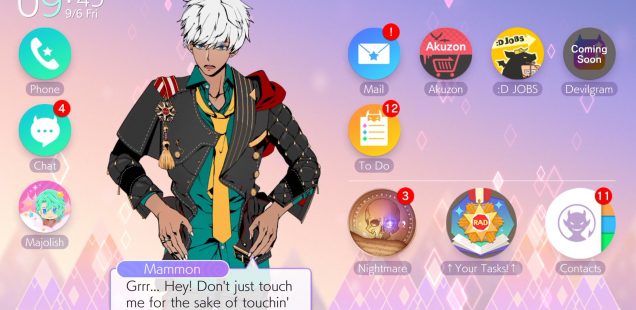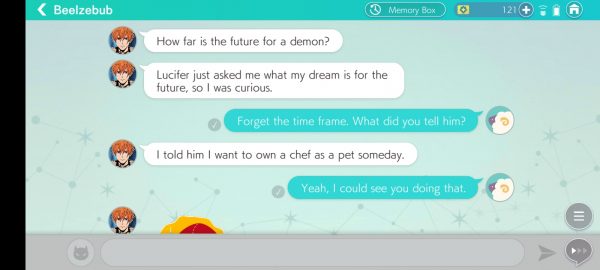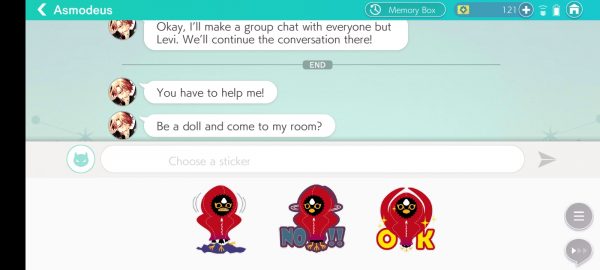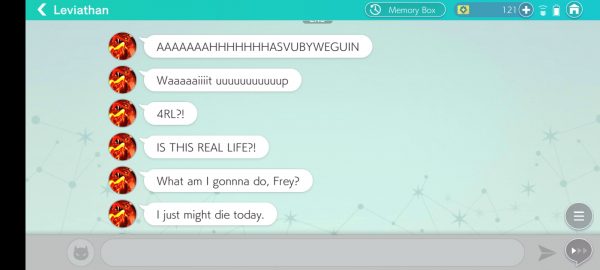
Let’s Play a Love Game: The Devil’s in the DMs
Eric Cline slides into the DMs.
Obey Me! is a mobile otome game in which the player-insert character gets to know seven different attractive anime boys. The catch is that the seven are all demonic princes of Hell, known as the House of Lamentation. The basic premise is that a human (the player-insert) gets selected for an exchange program in the Devildom and finds themself both dorming with and going to school alongside the seven demonic brothers, each of whom personifies a different deadly sin.
Despite its literally hellish setting, Obey Me! largely features standard genre conventions: an excess of gameplay modes, loot box mechanics for obtaining cards, dance battles within which one uses said cards, character developing plot scenarios, and more submenus and in-game currencies than you can shake a stick at. The core of gameplay revolves around the dance battles, success in which unlocks short scenes of the overarching plot. As one progresses in the story one learns more about the House of Lamentation’s members and their pasts, conveyed with a mix of melodrama and comedic antics. It’s one of the game’s less pivotal features that shines brightest, however: its text messaging.
The Chat tab of Obey Me! is populated by an ever-increasing number of separate text conversations. These include not just one-on-one chats with each bachelor but also group chats for virtually every combination of characters in the game. Perhaps most crucially, these messages are a distinct mode of gameplay unto themselves and not just brief interludes within the main story. Many games include replications of text-based communication. In Persona 5, the Phantom Thieves’ group chat acts as a key link between narrative events, helping the player maintain a clear understanding of events and what to do next. In terms of romance games specifically, Dream Daddy’s Dadbook social media site acts as a springboard for the player to learn about eligible bachelors and ask them out on dates. Obey Me!‘s text function, meanwhile, is notable for its interactivity, style, and sheer volume of content.

Reading text messages in Obey Me! is primarily a passive experience. The majority of dialogue always comes from other characters, with the player only getting a few opportunities at most per exchange to respond directly. The variety of choices in replies is quite impressive. How one chooses to respond to the love interests actually affects how they reply in turn; this is not a game that presents players with false choices just to end scenarios identically regardless.
For instance, in one conversation wherein Lucifer asked if I knew Mammon’s whereabouts, I chose to feign ignorance of who Mammon even was. Rather than get upset with me, Lucifer expressed sympathy with me and frustration about his younger brother. Thus, an exchange that could have implicated me in Mammon’s latest scheme instead played out with my receiving Lucifer’s favor, not his scorn.
The ability to alter one’s tone is especially important in giving the player-insert a sense of flexibility to suit one’s personality and courting strategies. This can even enable different approaches for different characters. For example, I tend to use a more forward approach with Beelzebub–a character who is outwardly kind though simple-minded–than I do with Mammon. The Avatar of Greed has an abrasive personality which engenders in me the desire to flirt with a more hard-to-get attitude. All in all, the ability to tailor one’s reactions to be supportive, dismissive, or coy is crucial. It helps the point-of-view character truly feel like an extension of the player, not just bland and underwritten the way lesser protagonists can.
Stylistically, another effective touch is the game’s inclusion of reaction images. At some points in conversation one will be prompted to choose from three different pictures to send in lieu of actual text. From an immersion standpoint this helps the texting experience feel all the more realistic; my group chats certainly feature many pictures when words aren’t enough to express sufficient disgust or indignation. The actual art used for these reactions is also very cute and well-conceived. Most images consist of impish-looking creatures reacting dramatically, reflecting both the game’s sense of humor and its paranormal aesthetic.

Beyond just the basics of its texting interface, Obey Me! further fosters a sense of choice through its deluge of texting content. One barely needs to play the game at all before the inbox starts to fill up so rapidly it’s outright intimidating from a completionist’s perspective. In all the months I’ve played the game I’ve never once successfully read all the messages available in my inbox at any given time.
Though it’s virtually impossible to stay fully caught up on messages in-game, there’s never any sense of falling behind or missing out on crucial information because of one’s slow pace. The text messages are additive to the game’s overall experience: they provide added humor and insight into characters, but they’re not so crucial to understanding fundamental plot points that reading them becomes a prerequisite for enjoying the game as a whole.
This enables the player to switch between other facets of gameplay as they wish, and helps the texts feel all the more natural. Outside of emergencies, most text messages and DMs in real life aren’t pivotal to one’s day either. The ability to choose between text threads is also a major plus for both realism and enjoyment. Within the story scenes unlocked by dance battles, one follows a rigidly structured plot that shifts focus across characters depending on which bachelor is most relevant to the events at hand. Within the Chat tab however the player can choose to speak to any character they want who has new messages to view. More often than not, this includes the entire core cast.
Of course, an abundance of choice is largely irrelevant if the quality of content to choose from is subpar. Fortunately, Obey Me!‘s Chat tab is the highlight of the game. With romance being the core point of the game, it would be easy for characters’ dialogue and storylines to feel redundant or insufficiently differentiated. Such is not the case here: each bachelor has a distinct personality that comes across not just in the content of his messages but also in his typing style, avatar choices, and more.

Take Leviathan, for instance. While most of the characters have photos of themselves as their avatars within the chat client, his is of a dragon (presumably from an in-universe anime or videogame). Leviathan is an otaku with a tendency to excitedly yammer on about idols, new anime film releases, and the like. Of all the bachelors, he’s the one most likely to elongate his words for dramatic effect, use acronyms, and otherwise deviate from proper grammar. As such, the delivery of his messages further reinforces the player’s sense of his character and contrasts him effectively against the less needy, more sociable characters.
Naturally, the rest of the cast have their own typing quirks and frequent topics as well. Beelzebub, the Avatar of Gluttony, constantly messages the player character about food and hunger. The humor comes from the extreme and devilish expression of said hunger, such as when he states that he wants to keep a personal chef “as a pet.” Meanwhile Lucifer, the eldest brother, is the most straight-laced of the characters. His messages always adhere to basic grammar rules and don’t tend to betray much passionate emotion; he’d rather save more vulnerable moments for in-person communication. Meanwhile Asmodeus, the Avatar of Lust, twists every reply into an opportunity to flirt and is particularly likely to use reaction images in conversation.
In many romance games, the player isn’t able to pursue multiple love interests at a time. Individual characters have their own storylines, with the player often starting out on a common route that introduces all one’s romantic prospects before having to commit to playing through just one partner’s story. Such is not the case with Obey Me!: all seven brothers remain smitten with the player-insert throughout, and the player can choose how much attention to pay (or not pay) to specific brothers’ texts. Though all characters remain constantly in play, the developers could have easily chosen to keep them confined to one-on-one text threads with the player character. Instead, however, the Chat app is also chock-full of group texts ranging in recipient size from two or three senders to the entire House of Lamentation. This contributes greatly to the amount of available content in such a way that at first feels overwhelming, but which I quickly grew accustomed to.

The best way to develop characters is often to place them in contrast to each other, and such is the case here. The brothers are all multifaceted and show different sides of their personalities depending on who they’re talking to. Beelzebub, for instance, takes on a more serious tone than usual when expressing concern for his younger brother Belphegor. The extremity of Asmodeus’s lack of sexual shame is made evident by the sorts of things he’s comfortable saying to his family members. Various factions (and resultant group chats) form across all sorts of lines, from shared hobbies to shared grievances. Even characters I was initially less drawn to grew on me throughout my time playing as I got a better sense of what unique roles they played within the Devildom’s social order.
While many games utilize faux text messages, Obey Me!‘s employment of them stands out from the pack in sheer volume and success. While they are a largely optional part of the gaming experience they also showcase a large amount of effort on behalf of the developers. In addition to fleshing out characters in both romantic and familial contexts, they are constructed in such a way as to give the player an impressive amount of choice, just as any real person has when they pick up their phone and scroll through their contacts. One’s choices are of course limited by what responses and content have been programmed, but the variety of options is so immense that I never felt limited in a way that hindered my experience. As a result, Obey Me! successfully delivers on its premise. What could be better than having an attractive demon in your DMs?
Eric Cline is a writer, editor, and podcaster. Besides being a columnist for Haywire Magazine he also co-hosts the comic book appreciation podcast Chris and Eric’s Longbox Adventure. His Twitter is @ZorakRichardson.